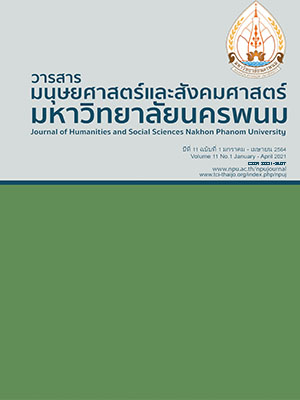The Communication of the Value of Wife and Other Thai Values In the Thai Digital TV Drama called “Mia (Wife) 2018”
Main Article Content
Abstract
This research aims to study the value of wife and other Thai values in the Thai digital TV drama called “Mia (Wife) 2018” through the new paradigm narrative. The methodology is textual analysis. Researcher analyzes the value of wife and other Thai values communicated through narrative components: plot, theme, conflict, character, setting, dialogue, point of view, and special symbol in the drama. The main results are: 1) The core value of wife presented in “Mia (Wife) 2018” is the by-design wife. Compared with the traditional definition of wife in Thai society that values the roles and duties of wife in terms of serving her family and dependence on husband, the wife in “Wife 2018” means a wife who is independent, and can design her own ways of life; and 2) Apart from the value of wife, “Mia (Wife) 2018” also communicates other positive Thai values such as debt of gratitude, Buddhist value, and etc. However, the drama presents the sexual value of being self-contained to preserve virginity of Thai women in a negative way. Contributions of the study are: 1) The TV drama producers as well as other media producers can adjust the way to communicate values through the media appropriately in order to make a paradigm shift toward women and other desirable values of people in Thai society; and 2) Restoration of values, ethics, and morality which are the main mechanism for guiding desirable behaviors can improve the quality of people and society.
Article Details
References
Buranajaroenkij, D. (2017). nǣokhit sattrī niyom læ khabūankān thāng sangkhom khō̜ng phūying nai prathēt Thai : phū mī sūan kīeokhō̜ng khō̜ thokthīang læ yutthasāt [Feminism and Social Movement of Women in Thailand: An Analysis of Stakeholders, Arguments, and Strategies]. Bangkok: Friedrich Ebert Stiftung. [in Thai]
Chaohinfar, D. (2010). khunnalaksana læ krabūankān plūkfang khunnatham čhariyatham khō̜ng prathēt Taiwan [Characteristics and Ethics and Morality Promotion Process in Taiwan. Bangkok: Morality Promotion Center.
Charoensin-o-larn, C. (2015). būdiyœ̄ kap thritsadī wādūai phākpatibat kān thāng sangkhom [Bourdieu and a theory of practice]. Vibhasa, 8 (5), 8-22. [in Thai]
Chuatong, R. and Rojjanaprapayon, R. (2016). khāniyom ʻudomkān læ rūpbǣp kānsư̄sān thī sadǣng thưng laksana thāng watthanatham khō̜ng Khon Thai [Values, Ideologies, and Communication Patterns Indicated Thais’ Culture]. NIDA Journal of Language and Communication, 21 (29), 110-143. [in Thai]
Department of Women's Affairs and Family Development. (2017). yutthasāt kānphatthanā sattrī Phō̜.Sō̜. sō̜ngphanhārō̜ihoksip - sō̜ngphanhārō̜ihoksipsī [National Strategy for Women Development B.E. 2560-2564]. Bangkok: Department of Women's Affairs and Family Development. [in Thai]
Hinviman, S. (2015). ʻān thawī kānmư̄ang watthanatham nai čhō̜ thōrathat [Read TV: Cultural Politics in Television]. Bangkok: Graphic Arts. [in Thai]
Kaewthep, K. (2013). sư̄sānmūanchon thritsadī læ nǣothāng kānsưksā [Mass Communication Theories and Study Approaches]. Bangkok: Graphic Arts. [in Thai]
Kaewthet, T. Suttiyotin, N. and Kachentaraphan, P. (2018). kān plīan phān lakhō̜n thōrathat Thai čhāk yuk ʻǣnalo̜k sū yuk dičhithan [The Transition of Thai TV Drama from the Analog to the Digital Era]. Valaya Alongkorn under Royal Patronage Research and Development Journal Humanities and Social Sciences, 13 (2), 266-275. [in Thai]
National Reform Council. (2015). wāra phatthanā thī sī : rabop khāniyom khunnatham čhariyatham phư̄a khwāmpen phonlamư̄ang thī dī læ manut thī sombūn [Development Agenda 4: Values, Ethics and Morality Systems for Good Citizen]. Bangkok: The Secretariat of the House of Representatives. [in Thai]
Rapeepat, A. and Iaosriwong, N. (2015). čhit phūm sak læ ʻong phēt phāwa nai sangkhom Thai [Jit Phumisak and Gender Issues in Thai Society]. Bangkok: Imprint. [in Thai]
Satha-anand, S. and Bunyanet, N. (1992). khwāmkhit læ phūmpanyā Thai : rō̜ngrō̜i khwāmkhit khwām chư̄a Thai [Key terms in Thai thoughts]. Bangkok: Chulalongkorn University Press. [in Thai]
Suklarpkit, S. (2013). phūa dīeo mīa dīeo nai sangkhom Thai samai mai čhāk thotsawat sō̜ngphansīrō̜isip thưng thotsawat sō̜ngphansīrō̜ipǣtsip [“Monogamy” in Modern Thai Society, 1870s-1940s] (Unpublished Master’s Thesis). Chulalongkorn University, Bangkok. [in Thai]
Toffler, A. (1980). The Third Wave. New York: William Morrow and Company.
Wongthet, P. (2016). phēt læ watthanatham [Gender and Culture]. Bangkok: Natahaek. [in Thai]
Yingpaiboonsuk, U. and Karuhadej, P. (2011). rāingān kānwičhai rư̄ang phētwithī khō̜ng naksưksā nai khēt Rattanakōsin kō̜ranī sưksā mahāwitthayālairātchaphat sūansunantha [Research Title : Students’ Sexuality in Rattanakosin Province Case Study at Suan Sunandha Rajabhat University]. Bangkok: Suan Sunandha Rajabhat University. [in Thai]


